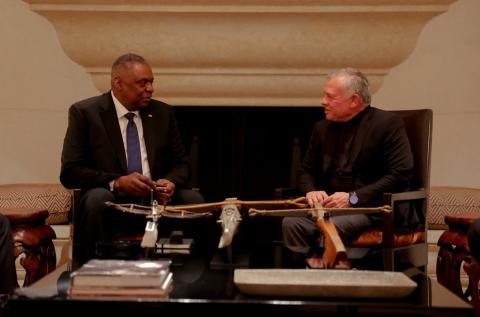
He said the US “does not seek war with Iran, but we are prepared to do so if necessary”
Esper was in Iraq Wednesday to discuss the withdrawal and the Daesh threat with Iraqi leaders and his military commanders
DUBAI: Iran targeted the Saudi facilities in Aramco in September, US Secretary of Defense Mark Esper said on Thursday, reiterating calls to deter the country’s threats.
Esper, who was speaking at the German Marshall Fund in Brussels, referred to the drone attacks at several Aramco sites on Sept. 14, saying “Iran threatens international navigation in the Gulf.”
He added the US “does not seek war with Iran, but we are prepared to do so if necessary.”
Meanwhile, the Pentagon chief also lashed out at Turkey for its military assault on Syrian Kurdish fighters across the border into Syria, days after the US withdrew its troops from the war-torn country.
Esper says Turkey’s unwarranted invasion into Syria jeopardizes security gains made in recent years as the US-led coalition and allied Syrian Kurdish forces battled the Daesh group.
President Donald Trump announced Wednesday that the US is lifting sanctions on Turkey after the NATO ally agreed to permanently stop fighting Kurdish forces in Syria. Esper was in Iraq Wednesday to discuss the withdrawal and the Daesh threat with Iraqi leaders and his military commanders.
(With Reuters)
Topics: IRAN US GULF MARK ESPER
HIDE COMMENTS
RELATED
4837
SAUDI ARABIA
US Secretary of Defense Esper meets King Salman, asks NATO to protect Saudi Arabia from Iran
231
MIDDLE-EAST
Rouhani: New sanctions against Iran signals US ‘desperation’
NATO hammers Turkey on Syria operation
Updated 24 October 2019
AFP
October 24, 2019
17:36
135
The first day of a two-day meeting of the ministers in Brussels was dominated by the Turkish operation in Syria
BRUSSELS: NATO defense ministers Thursday slammed Turkey for its military operation in Syria conducted with Russia’s help, but recognized there was little they could do to sanction their strategically important ally.
The first day of a two-day meeting of the ministers in Brussels was dominated by the issue, with Turkey isolated among the 29 member states because of its incursion against Kurdish fighters it considers “terrorists” but who are key in the fight against the Daesh group in Syria.
NATO Secretary General Jens Stoltenberg described discussions as “frank and open” — euphemisms for sharp discord — and noted “we have seen disagreements before” but the transatlantic alliance has endured.
He stressed that the ministers agreed on the need to “maintain our unity in the fight against Daesh,” referring to the IS group being fought in Syria, Iraq, Afghanistan and elsewhere by a broad international coalition including many NATO members.
Germany presented an idea it floated this week of international troops being deployed to create a security zone in northeast Syria — a notion that has been met tepidly by allies because of the situation on the ground and the need for a UN mandate.
The top commander of Syria’s Kurdish force, Mazloum Abdi, welcomed the proposal, telling journalists in northern Syria that “we demand and agree to this.”
But the NATO ministers did not directly embrace the German plan. Stoltenberg said they instead stressed their “broad support... for ways to engage the international community to find a political situation” in northern Syria.
Before the meeting, German Defense Minister Annegret Kramp-Karrenbauer said she and her French and British counterparts believed a Turkish-Russian agreement to jointly patrol a “safe zone” inside northern Syria “does not provide a permanent basis for a political solution.”
Belgium’s defense minister, Didier Reynders, said of Germany’s troops idea: “In principle we are in favor of such an agreement to work together — but then again, the situation is totally different now” following the Turkey-Russia agreement.
US Defense Secretary Mark Esper, speaking at a think tank conference in Brussels before the NATO meeting, was blunt about Turkey, saying it was “heading in the wrong direction.”
“Turkey put us all in a very terrible situation and I think the incursion’s unwarranted,” Esper said.
He defended the withdrawal of “less than 50” US troops from northern Syria that cleared a path for the Turkish operation, arguing it was the only way to preserve the soldiers’ lives, and that in any case he was not “about to start a fight with a NATO ally.”
US President Donald Trump on Wednesday summed up American strategy in Syria by saying: “Let someone else fight over this long blood-stained sand.”
However on Thursday, he tweeted: “I appreciate what the Kurds have done. Perhaps it is time for the Kurds to start heading to the Oil Region!“
That referred to a non-Kurdish, crude-rich desert zone in Syria’s northeast under US control that Trump wants to prevent falling into the hands of the Syrian regime or its Iranian or Russian partners.
Turkey’s actions, its rapprochement to Russia and its threat to its European allies in NATO to unleash a wave of refugees if they dared criticize the assault in Syria have unnerved many in the transatlantic alliance.
“When we say we will open the gates, they are up in arms. Don’t be up in arms, the gates will be opened when the time comes,” Turkish President Recep Tayyip Erdogan said in a televised speech in Ankara.
Topics: SYRIA NATO TURKEY
SHOW COMMENTS
RELATED
4837
SAUDI ARABIA
US Secretary of Defense Esper meets King Salman, asks NATO to protect Saudi Arabia from Iran
1612
MIDDLE-EAST
Macron slams Turkey’s aggression in Syria as ‘madness’, bewails NATO inaction
Latest Updates
NEOM project draws interest at Japan-Saudi conference in Tokyo
77
Twitter tumbles as ‘bugs’ hit revenue growth
17
NATO hammers Turkey on Syria operation
135
Maximum pressure only way to get Iran to negotiate: Saudi Arabia’s Al-Jubeir
760
After exhumation, Spain reburies Franco in discreet tomb
488
Recommended
WORLD
Indonesians divided over plan to move capital from Jakarta
1643









